Are you looking for simple, nourishing ways to manage everyday worries? Many people feel stressed or anxious due to hectic schedules and uncertainty in life. While short-term methods like deep breathing can help, some health enthusiasts explore pumpkin seeds for anxiety as a steady way to promote calm. These crunchy seeds have earned acclaim for their high magnesium content, vital amino acids, and other nutrients that may positively influence mood.
In this article, we’ll delve into the science behind pumpkin seeds for anxiety and uncover how they fit into a balanced diet. You’ll learn about the specific nutrients that may soothe frayed nerves, discover easy recipes that let you enjoy pumpkin seeds daily, and gain insights into their potential role as part of a broader approach to mental wellness. By the end, you’ll have a clear understanding of how pumpkin seeds work, why hydration is also essential, and how maintaining healthy macronutrient levels supports a calmer mind. Let’s dive in and see if pumpkin seeds can be a simple path toward feeling more relaxed.
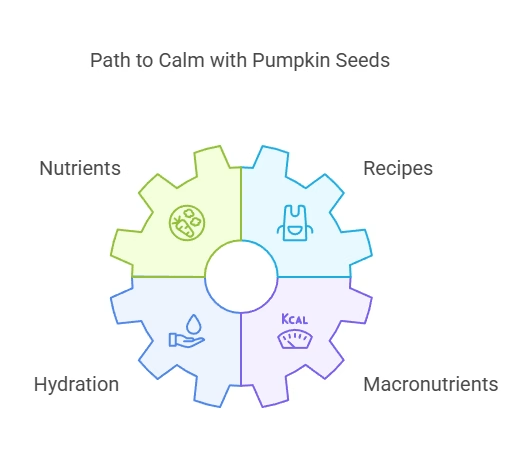
1. The Nutritional Basics of Pumpkin Seeds
When exploring pumpkin seeds for anxiety, it helps to start with their overall nutrient profile. Pumpkin seeds pack magnesium, zinc, iron, and a range of macronutrient essentials like protein and healthy fats. For instance, about one ounce (roughly a handful) of pumpkin seeds contains almost 150 mg of magnesium, a mineral often linked to improved relaxation and sleep. In fact, managing anxiety with pumpkin seeds and magnesium is one of the top points across reputable sources (Medical News Today, 2023).
Why is magnesium so important? Research suggests that insufficient magnesium levels might contribute to heightened stress responses and difficulty sleeping. Restoring magnesium balance can help the body relax. Beyond magnesium, these seeds also contain tryptophan—an amino acid involved in serotonin production. Serotonin is sometimes called the “feel-good” neurotransmitter because it can influence mood. That’s why pumpkin seeds and serotonin for mood balance come up frequently in health articles.
Plus, pumpkin seeds naturally fit into a balanced diet. Their protein supports muscle health, and their good fats help keep you full. When combined with other nutrient-rich whole foods, they can become an easy step towards better mental well-being. For those looking to reduce stress with pumpkin seeds, this small nutritional powerhouse might be a worthwhile addition to daily meals. It’s an uncomplicated way to ensure you’re giving your body the building blocks it needs to function optimally, potentially keeping stress and anxiety levels in check.
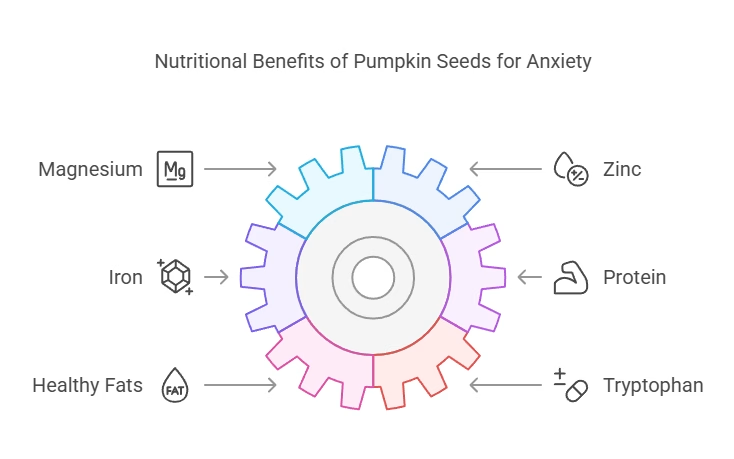
2. How Pumpkin Seeds May Support Mental Well-Being
The connection between pumpkin seeds for anxiety and mental well-being often revolves around their biochemical properties. Magnesium is the star player, but there’s more to the story. These seeds are also rich in antioxidants like vitamin E, which combats oxidative stress in the body. Chronic oxidative stress has been associated with elevated tension levels, so foods brimming with antioxidants may play a role in promoting a calmer state of mind (Office of Dietary Supplements, 2020).
Moreover, pumpkin seeds supply zinc, a nutrient that has been studied for its relationship with mood regulation. Do pumpkin seeds help with panic attacks? While evidence is still emerging, some research indicates that balanced zinc levels could influence neurotransmitter function, thus helping people feel less on edge. Zinc deficiencies have been linked with changes in behavior, so ensuring you have enough may be beneficial.
In addition, the presence of tryptophan in pumpkin seeds ties to the production of serotonin, a chemical messenger in the brain that fosters feelings of well-being and happiness. Coupled with good overall nutrition, pumpkin seeds might indirectly aid in reducing anxiety symptoms. Even if you’re not convinced they can stand in for therapy or medications—pumpkin seeds vs. medication for anxiety remains a debated topic—they can at least serve as a nutritious, low-risk supplement to your routine.
Finally, consider synergy: a good diet, regular exercise, and sufficient vitamin D from sunlight or supplements can complement the calm you may gain from pumpkin seeds. The body is interconnected; one positive health choice can amplify the benefits of another, leading to a more holistic approach to reducing stress.
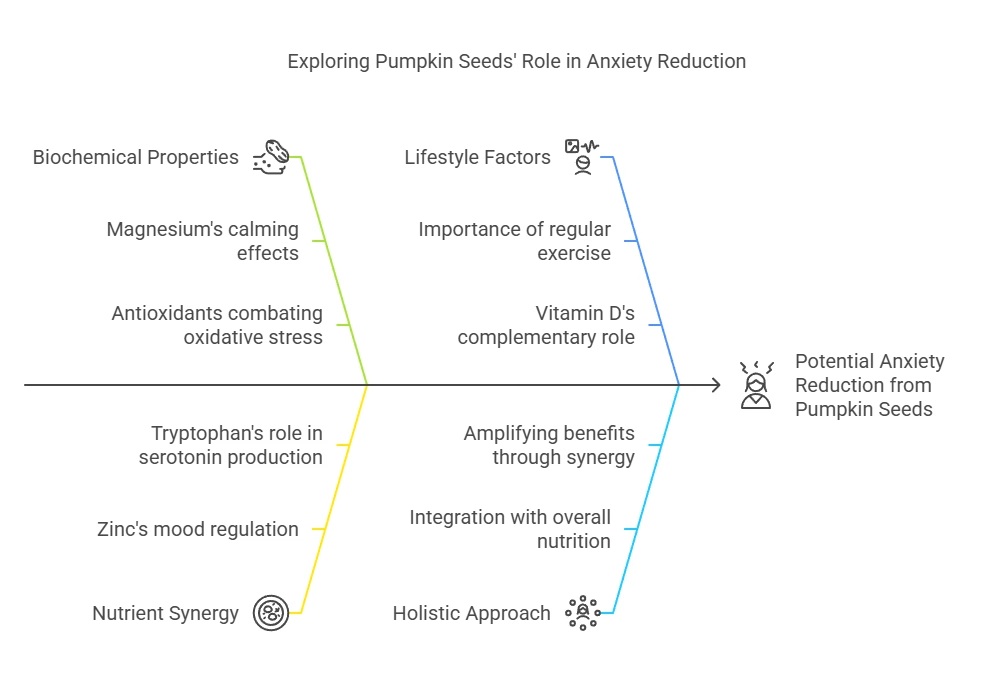
3. Practical Ways to Incorporate Pumpkin Seeds Into a Balanced Diet
Curious about how to add pumpkin seeds for anxiety into everyday meals? It’s easier than you might think. If you enjoy snacking between meals, a handful of roasted pumpkin seeds is a simple way to keep hunger at bay while potentially nurturing a calmer state of mind. Sprinkle them over oatmeal or yogurt in the morning to give yourself a magnesium boost right away.
For lunch or dinner, try mixing pumpkin seeds into salads or blending them into homemade pesto. Their mild, nutty flavor pairs well with fresh greens, whole grains, or even roasted vegetables. Some enthusiasts take it a step further by grinding pumpkin seeds into flour for protein-rich baking. Easy ways to add pumpkin seeds to your daily meals include using them as a crunchy topping for soups, tossing them into trail mixes, or blending them with bananas and spinach for a smoothie loaded with nutrients.
Of course, variety is key to maintaining a balanced diet. Pumpkin seeds alone won’t make or break your nutritional plan, but they can complement other nourishing foods like fruits, vegetables, and lean proteins. Keep in mind the importance of hydration; regularly drinking water can help you hydrate properly, which in turn supports digestion and overall well-being. Taking a moment to sip water alongside your daily portion of pumpkin seeds can offer a small, meaningful step toward a more holistic approach to feeling calm and steady.
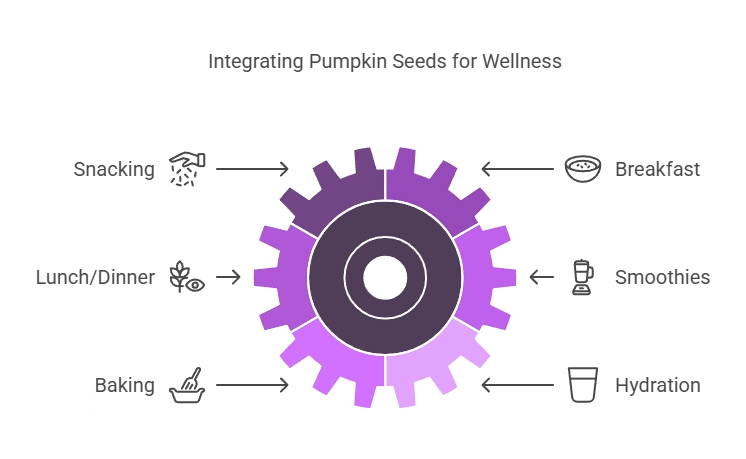
4. Unique Insights—Combining Pumpkin Seeds With Hydration and Vitamin D
A lesser-discussed topic is how pumpkin seeds for anxiety interact with other lifestyle factors, such as proper hydration and adequate vitamin D levels. You might be wondering: Are pumpkin seeds and hydration connected to calmer moods? While the link is indirect, staying hydrated supports healthy circulation and helps transport nutrients—like magnesium—to where they’re needed. When you hydrate consistently, you essentially optimize the uptake of the beneficial minerals found in pumpkin seeds.
Meanwhile, vitamin D is crucial for immune function and mood regulation. Low levels of vitamin D have been correlated with depressive symptoms in some studies (Harvard T.H. Chan, 2021). Pairing vitamin D-rich foods—like fatty fish or fortified dairy—with pumpkin seeds could yield a synergistic effect that nourishes both the brain and body. Imagine a simple breakfast of scrambled eggs (fortified with vitamin D) alongside a sprinkling of pumpkin seeds. This kind of meal covers multiple nutritional bases, from protein to vital minerals.
For a more direct route to vitamin D, you can spend brief periods in sunlight if your climate allows. Whether you’re a busy professional or a fitness enthusiast, stepping outside for fresh air and sunshine can also promote a sense of calm. If you combine that with the magnesium in pumpkin seeds, you might notice subtle improvements in mental clarity and mood over time. While it won’t solve severe anxiety on its own, this layered approach—consuming pumpkin seeds, staying hydrated, and ensuring adequate vitamin D—can create a well-rounded platform for better stress management.
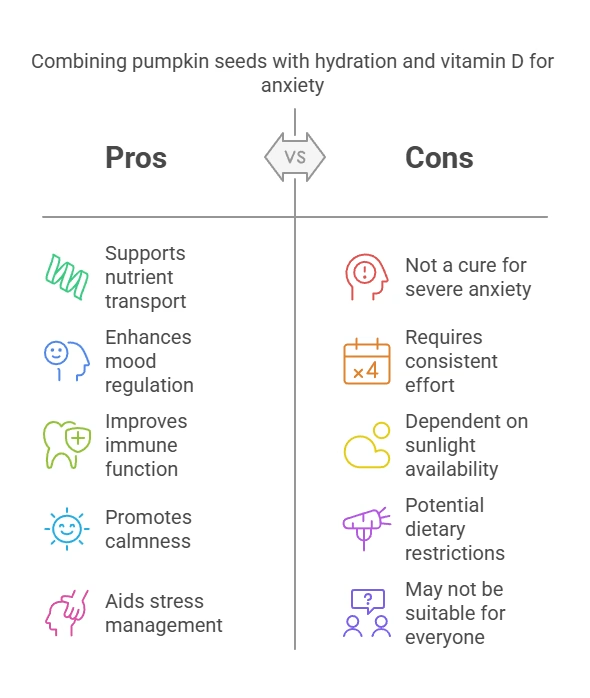
5. Real-World Examples and Case Studies
Many articles discussing pumpkin seeds for anxiety reference anecdotal experiences alongside emerging research. For example, a small group of friends might have started incorporating pumpkin seeds into their daily snacks after reading about managing anxiety with pumpkin seeds and magnesium. Within weeks, they reported feeling slightly more balanced during their workdays, although they acknowledged that the effect was subtle and enhanced by other healthy habits like regular walks and mindful breathing.
In a more structured scenario, an informal pilot test within a community wellness group found that individuals who ate at least two tablespoons of pumpkin seeds each day felt they had fewer bouts of restlessness during the evening. While not a formal clinical trial, these stories can offer meaningful insights, especially when combined with the fact that pumpkin seeds pose little risk for most people (Healthline, 2023).
Though these personal accounts are promising, keep in mind that anxiety is multifaceted. Pumpkin seeds for anxiety should be part of a broader lifestyle that may include therapy, exercise, social support, and possibly medical intervention if needed. No single food can act as a silver bullet, but seeds do provide nutrition-packed seeds for mental wellness. If you integrate them consistently—while staying hydrated, prioritizing a balanced diet, and getting enough vitamin D—you could see incremental benefits. These real-world examples underscore that dietary tweaks can sometimes help you take small yet meaningful steps toward more relaxed and steady days.
Quick Takeaways
- Pumpkin seeds for anxiety are notable because they contain magnesium, tryptophan, and antioxidants that may support mental well-being.
- These seeds fit well into a balanced diet, providing essential macronutrient elements like protein and healthy fats.
- Adequate hydration amplifies the benefits of pumpkin seeds by aiding nutrient transport within the body.
- Pairing pumpkin seeds with vitamin D sources, such as fortified foods or sunlight exposure, could further improve mood support.
- Real-world examples show subtle but positive shifts in stress levels when pumpkin seeds become part of a consistent routine.
- Reducing stress with pumpkin seeds is best approached alongside other healthy practices like exercise and therapy.
- Experiment with various ways to include pumpkin seeds—from salads to smoothies—to keep your diet diverse and enjoyable.
Conclusion
Pumpkin seeds for anxiety is more than a catchy phrase—these nutrient-dense seeds bring magnesium, tryptophan, zinc, and antioxidants that can help foster calm. When you sprinkle them over your morning meal, toss them into a salad, or enjoy them as a quick snack, you supply your body with building blocks that may contribute to improved mental clarity. This calming boost isn’t a magical cure-all, but rather a small, meaningful step in your overall wellness routine.
Beyond their nutritional impact, pumpkin seeds remind us how interconnected our health truly is. Pairing them with a balanced diet, proper hydration, sufficient vitamin D, and regular physical activity creates the kind of holistic environment in which mind and body thrive. While some people have noticed subtle improvements in their daily stress levels by adding seeds to their meals, it’s crucial to remember that anxiety can stem from multiple factors.
Still, these small changes in everyday habits can stack up. You might feel more at ease knowing you’re actively choosing nutritious foods that nurture your mind, whether you’re managing mild worries or simply seeking better overall well-being. By taking a balanced approach and weaving in pumpkin seeds for anxiety alongside proven lifestyle practices, you can create a supportive foundation for calmer, more peaceful days.
FAQs About Pumpkin Seeds for Anxiety
- Do pumpkin seeds help with chronic anxiety?
Pumpkin seeds may support chronic anxiety by offering magnesium and tryptophan, two nutrients tied to mood regulation. However, always consult a healthcare professional for severe or persistent anxiety. - How many pumpkin seeds should I eat each day to feel a difference?
Most individuals find that 1–2 tablespoons per day fit easily into a balanced diet. Pairing them with proper hydration and vitamin D may boost potential benefits. - Are pumpkin seeds vs. medication for anxiety equally effective?
Pumpkin seeds are a natural complement to other treatments, but they aren’t a substitute for medication or therapy. If anxiety is significantly impacting your life, professional guidance remains crucial. - Can pumpkin seeds improve my sleep quality?
Yes, the magnesium and tryptophan in pumpkin seeds can support better sleep, which in turn may help reduce stress and anxiety over time. - Should I soak or roast my pumpkin seeds first?
Soaking or roasting is a personal preference. Both can enhance flavor. If you soak them, you might improve nutrient absorption. Roasted seeds are convenient for on-the-go snacking.
References
- Healthline. (2023). Benefits of Pumpkin Seeds.
- Medical News Today. (2023). Magnesium and Anxiety
- Office of Dietary Supplements. (2020). Magnesium Fact Sheet for Health Professionals.
- Harvard T.H. Chan School of Public Health. (2021). Vitamin D and Health.
- Cleveland Clinic. (2022). Nuts and Seeds for Health and Wellness.
